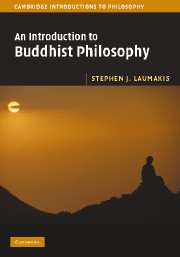Book contents
- Frontmatter
- Contents
- Acknowledgments
- Epigraph
- Preface
- Part I A sketch of the Buddha and the Dhamma
- Part II Details of the Dhamma
- Part III Development of the Dhamma/Dharma
- 9 Bodhidharma's and Huineng's Buddhisms
- 10 Pure Land Buddhism
- 11 Tibetan Buddhism
- 12 Two forms of contemporary Buddhism
- Glossary
- Bibliography
- Index
9 - Bodhidharma's and Huineng's Buddhisms
Published online by Cambridge University Press: 05 June 2012
- Frontmatter
- Contents
- Acknowledgments
- Epigraph
- Preface
- Part I A sketch of the Buddha and the Dhamma
- Part II Details of the Dhamma
- Part III Development of the Dhamma/Dharma
- 9 Bodhidharma's and Huineng's Buddhisms
- 10 Pure Land Buddhism
- 11 Tibetan Buddhism
- 12 Two forms of contemporary Buddhism
- Glossary
- Bibliography
- Index
Summary
Key terms and teachings
Dao: Chinese term for the “way”/“path” and source of all being.
Diamond Sutra: English name of the Mahayana Vajracchedika-prajnaparamita Sutra. It is concerned with the perfection of wisdom and the teaching on emptiness.
Gradual Enlightenment: In Chinese Buddhism this is the view of the “Northern School” that enlightenment is realized only gradually after many years of practice and meditation.
Koan: Zen term (from Chinese kung-an) literally meaning “public case.” It refers to a question or puzzle that is meant to help practitioners overcome dualistic thinking and realize insight into reality.
Lankavatara Sutra: Collection of Mahayana teachings, especially of Yogacara Buddhism, focusing on the role of the mind, various forms of consciousness, emptiness, and tathagata-garbha (womb of the Buddha). It was very influential in the Chan and Zen traditions.
Lotus Sutra: English name for the Saddhammapunarika Sutra which expounds the idea that there is really only one true vehicle or Ekayana, and that the Buddha, out of compassion, continues to be present in the world to help those in need of his assistance.
Paramitas: Sanskrit term for “perfections” or “virtuous qualities” possessed by the Mahayana ideal of practice, the bodhisattva. These include: generosity or giving – dana, morality – sila, patience or forbearance – khanti/ksanti, effort or zealous striving – viriya/virya, meditation or focused mind – jhana/dhyana or samadhi, and wisdom or insight – prajna.
Platform Sutra: Chinese sutra containing the biography and teachings of Huineng, the sixth patriarch of the Chan school of Buddhism.
Paccekabuddha/Pratyekabuddha: Pali and Sanskrit for a “solitary” Buddha who does not teach the Dhamma to other beings. […]
- Type
- Chapter
- Information
- An Introduction to Buddhist Philosophy , pp. 177 - 206Publisher: Cambridge University PressPrint publication year: 2008



